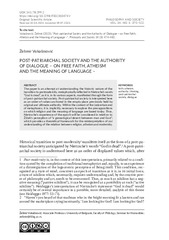Prikaz osnovnih podataka o dokumentu
Post-patriarchal Society and the Authority of Dialogue – on Free Faith, Atheism and the Meaning of Language
Post-patrijarhalno društvo i autoritet dijaloga – o slobodnoj veri, ateizmu i smislu jezika
| dc.creator | Vukašinović, Želimir | |
| dc.date.accessioned | 2023-10-26T08:40:51Z | |
| dc.date.available | 2023-10-26T08:40:51Z | |
| dc.date.issued | 2023 | |
| dc.identifier.issn | 0353-5738 | |
| dc.identifier.uri | http://rifdt.instifdt.bg.ac.rs/123456789/3038 | |
| dc.description.abstract | The paper is an attempt at understanding the historic nature of the transition to postmodernity, metaphysically reflected in Nietzsche’s words “God is dead”, as it is, in its various aspects, manifested through the form of post-patriarchal society. Post-patriarchal society is interpreted here as an order of values anchored in the empty place previously held by original and ultimate authority. Within the context of the (un)certain end of metaphysics, it is, implicitly, necessary to explore the presuppositions on which religion and the meaning of language are based today. Thus, Nietzsche’s experience of the epoch will be considered in relation to Žižek’s perception of “a genealogical desert between man and God”, which provides a theoretical framework for the reinterpretation of our understanding of the relation between religion, atheism and modernity. | sr |
| dc.description.abstract | Rad polazi od nastojanja da se razume priroda istorijskog prelaza u savremenost kojeg metafizički evidentiraju Ničeove reči „Bog je mrtav“, a koji se, u različitim svojim svojstvima, ispoljava u obliku postpatrijarhalnog društva. Postpatrijarhalno društvo se ovde interpretira kao poredak razmeštenih vrednosti koji ima svoje težište u praznom mestu izvornog i krajnjeg autoriteta. To će značiti i da istina preporođenja čovekovog nije na mestu na kome je tražimo ili očekujemo, pa je nužno za raspraviti šta je i na čemu se, u (ne)izvesnosti kraja metafizike, vera i smisao jezika danas zasnivaju. Ničeovo iskustvo epohe će se, iz navedenog konteksta, razmatrati kroz Žižekovo poimanje „genealoške pustinje između čoveka i Boga“, jednako kroz reinterpretaciju odnosa između religije, ateizma i modernosti. | sr |
| dc.language.iso | en | sr |
| dc.publisher | Beograd : Institut za filozofiju i društvenu teoriju | sr |
| dc.rights | openAccess | sr |
| dc.rights.uri | https://creativecommons.org/licenses/by/4.0/ | |
| dc.source | Filozofija i društvo / Philosophy and Society | sr |
| dc.subject | faith | sr |
| dc.subject | atheism | sr |
| dc.subject | authority | sr |
| dc.subject | thinking | sr |
| dc.subject | post-patriarchal society | sr |
| dc.subject | dialogue | sr |
| dc.title | Post-patriarchal Society and the Authority of Dialogue – on Free Faith, Atheism and the Meaning of Language | sr |
| dc.title | Post-patrijarhalno društvo i autoritet dijaloga – o slobodnoj veri, ateizmu i smislu jezika | sr |
| dc.type | article | sr |
| dc.rights.license | BY | sr |
| dc.citation.issue | 3 | |
| dc.citation.volume | 34 | |
| dc.citation.spage | 474 | |
| dc.citation.epage | 482 | |
| dc.identifier.doi | 10.2298/FID2303474V | |
| dc.type.version | publishedVersion | sr |
| dc.identifier.fulltext | http://rifdt.instifdt.bg.ac.rs/bitstream/id/10493/bitstream_10493.pdf |

